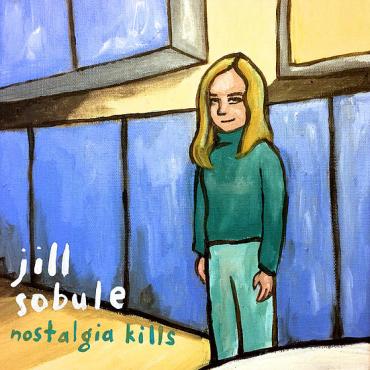Jill Sobule Takes an Introspective Look at the Past

Jill Sobule established herself as a gifted singer-songwriter with the groundbreaking “I Kissed a Girl” and “Supermodel” in 1995, setting into motion a career that spans 12 albums and musical contributions to various TV shows with a catalog of honest songs. We all identify with the feeling of nostalgia, and Sobule manages to take this common theme and flip it on its head with her latest album, Nostalgia Kills. Her first album in nine years, Sobule stays true to her pure heart and voice to match, while still reaching musical depths that make her a dynamic artist.
The album’s opening track, the daring “I Don’t Wanna Wake Up,” reflects this. According to a press release, the song is the result of a mushrooms trip combined with the emotions of the loss of a parent mixed with a tough breakup. Sobule mirrors these complicated feelings through an imaginative song that portrays images of the singer flying through the air with snakes down below while sharing her secret desire to be redeemed.
She continues down this thought-provoking path on the grunge-sounding “Where Do I Begin?” using a dirty room as a metaphor for her cluttered life as she takes the first step toward cleansing her soul. Whether fixing a broken guitar or picking up the “memory of a beautiful broken dream,” the singer is bravely trying to figure out where to begin the healing process “before I can’t find myself.” From here, she finds peace while escaping from reality through her dreams before she wakes up and is “back in the guilt cage that you made for me” on the ethereal “I Put My Headphones On” and carries this curious nature into “The Island of Lost Things.”
These thought-provoking numbers set the stage for Sobule to demonstrate her probing look at the feeling of nostalgia and past youth through the title track that takes us on a haunting walk down memory lane as she poetically sings “we look at ourselves in our long trail of tears …when we open the box then another appears, look at ourselves in a long row of mirrors, we get smaller and smaller with each passing year, we have to keep moving or die.”
Sobule tells the story of a woman confronting her fleeting youth, sadly looking back on her younger years, on “The Party’s Over Party Girl” and paints an honest portrait of undeniable change on the gentle “Tomorrow is Breaking,” giving the song another life by recording it a second time with John Doe. The piano rendition gives the track a free spirit while Doe’s contribution adds a sense of melancholy, a feeling she carries into the waning “Forbidden Thoughts of Youth” that proclaims “you will never know the truth” as Sobule looks back on memories of her childhood, including the feeling of admiring a forbidden love from afar.
Throughout the album’s 15 original tracks, Sobule weaves a tapestry that beautifully captures the notions of nostalgia and youth, looking at them through a distinct lens and transforming her insightful views into music. At times, the project feels like a lullaby, like on the hopeful “Don’t Let Us Get Sick” and encouraging “Ooh Child,” while Sobule simultaneously confronts her demons of the past with strength and grace, as demonstrated on songs “Where Do I Begin?” and “Forbidden Thoughts of Youth.”
“Nostalgia can be wonderful and amazing. It’s OK to look back. But then you gotta get the fuck out of there,” Sobule states, a notion she embodies on Nostalgia Kills, a project that turns over a new stone while still holding on to her genuine soul with a message to share, a defining characteristic of her storied career.



